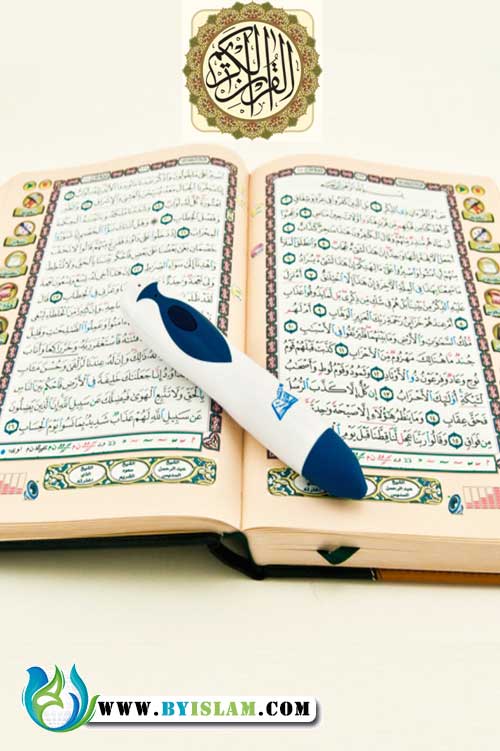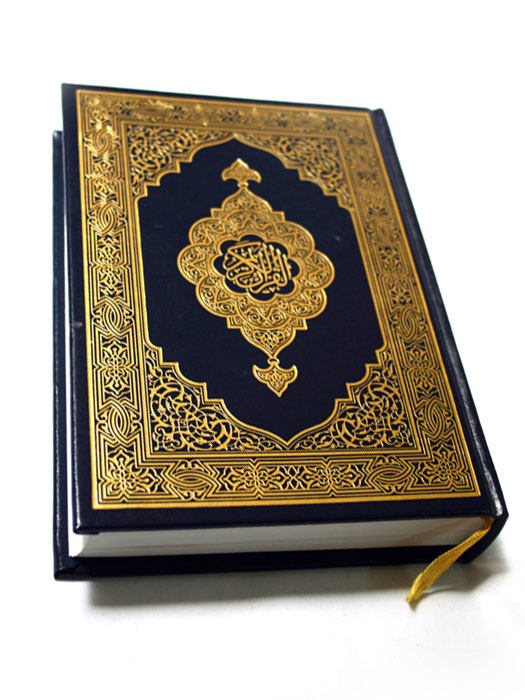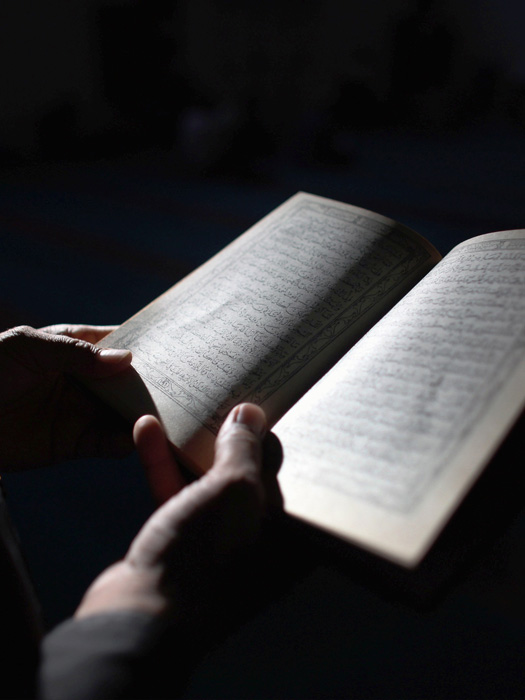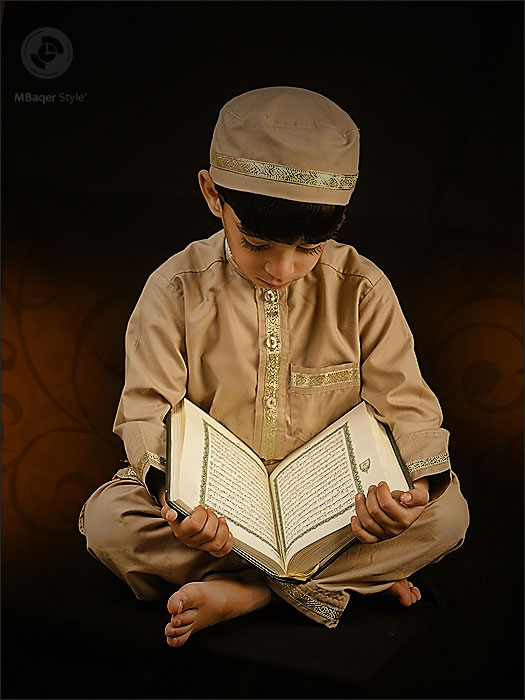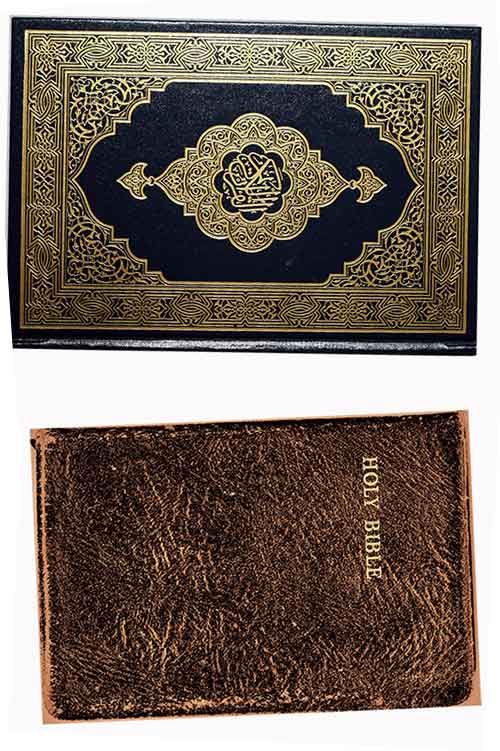
Question:
Is it true that Holy Quran has gotten much of its content from Bible?
Answer:
Many critics allege that Prophet Muhammad (pbuh) himself was not the author of the Qur’an but he learnt it and/or plagiarized (copied or adapted) it from other human sources or from previous scriptures or revelations.
1. Muhammad learnt the Quran from a roman blacksmith who was a Christian
Some Pagans accused the Prophet of learning the Qur’an from a Roman Blacksmith, who was a Christian staying at the outskirts of Mecca. The Prophet very often used to go and watch him do his work. A revelation of the Qur’an was sufficient to dismiss this charge – the Qur’an:
“We know indeed that they say, ‘It is a man that teaches him,’ the tongue of him they wickedly point to is notably foreign, while this is Arabic, pure and clear.” [An-Nahl 16:103]
How could a person whose mother tongue was foreign and could hardly speak little but of poor broken Arabic be the source of the Qur’an which is pure, eloquent, fine Arabic? To believe that the blacksmith taught the Prophet the Qur’an is somewhat similar to believing that a Chinese immigrant to England, who did not know proper English, taught Shakespeare.
2. Muhammad (pbuh) learnt from Waraqa – the relative of khadijah (ra)
Muhammad’s (pbuh) contacts with the Jewish and Christian Scholars were very limited. The most prominent Christian known to him was an old blind man called Waraqa ibn-Naufal who was a relative of the Prophet’s first wife Khadijah (r.a.). Although of Arab descent, he was a convert to Christianity and was very well versed with the New Testament. The Prophet only met him twice, first when Waraqa was worshipping at the Ke’ba (before the Prophetic Mission) and he kissed the Prophet’s forehead affectionately; the second occasion was when the Prophet went to meet Waraqa after receiving the first revelation. Waraqa died three years later and the revelation continued for about 23 years. It is ridiculous to assume that Waraqa was the source of the contents of the Qur’an.
3. Prophet’s religious discussions with the Jews and Christians
It is true that the Prophet did have religious discussions with the Jews and Christians but they took place in Medina more than 13 years after the revelation of the Qur’an had started. The allegation that these Jews and Christians were the source is perverse, since in these discussions Prophet Muhammad (pbuh) was performing the roles of a teacher and of a preacher while inviting them to embrace Islam and pointing out that they had deviated from their true teachings of Monotheism. Several of these Jews and Christians later embraced Islam.
4. The prophet learnt the Qur’an from those Jews and Christians that he met outside Arabia
All historical records available show that Muhummad (pbuh) had made only three trips outside Makah before his Prophethood:
• At the age of 9 he accompanied his mother to Medina.
• Between the age of 9 and 12, he accompanied his uncle Abu-Talib on a business trip to Syria.
• At the age of 25 he led Khadija’s Caravan to Syria.
It is highly imaginary to assume that the Qur’an resulted from the occasional chats and meetings with the Christians or Jews from any of the above three trips.
5. Logical grounds to prove that the prophet did not learn the Qur’an from Jews or Christians
I. The day-to-day life of the Prophet was an open book for all to see. In fact a revelation came asking people to give the Prophet (pbuh) privacy in his own home. If the Prophet had been meeting people who told him what to say as a revelation from God, this would not have been hidden for very long.
II. The extremely prominent Quraish nobles who followed the Prophet and accepted Islam were wise and intelligent men who would have easily noticed anything suspicious about the way in which the Prophet brought the revelations to them – more so since the Prophetic mission lasted 23 years.
III. The enemies of the Prophet kept a close watch on him in order to find proof for their claim that he was a liar – they could not point out even a single instance when the Prophet may have had a secret rendezvous with particular Jews and Christians.
IV. It is inconceivable that any human author of the Qur’an would have accepted a situation in which he received no credit whatsoever for originating the Qur’an.
Thus, historically and logically it cannot be established that there was a human source for the Qur’an.
6. Muhammad (pbuh) was an illiterate
The theory that Muhammad (pbuh) authored the Qur’an or copied from other sources can be disproved by the single historical fact that he was illiterate.
Allah testifies Himself in the Qur’an in Surah Al-Ankabut: “And thou were not (able) to recite a Book before this (Book came), nor art thou (able) to transcribe it with thy right hand: in that case, indeed, would the talkers of vanities have doubted.” [Al-Ankaboot 29:48]
Allah (swt) knew that many would doubt the authenticity of the Qur’an and would ascribe it to Prophet Muhummad (pbuh). Therefore Allah in His Divine Wisdom chose the last and final Messenger to be an ‘Ummi’, i.e. unlettered, so that the talkers of vanity would not then have the slightest justification to doubt the Prophet. The accusation of his enemies that he had copied the Qur’an from other sources and rehashed it all in a beautiful language might have carried some weight, but even this flimsy pretence has been deprived to the unbeliever and the cynic.
Allah reconfirms in the Qur’an in Surah Al A’raf chapter 7, verse 157:
“Those who follow the Messenger, the unlettered Prophet, whom they find mentioned in their own (Scriptures) in the Law and the Gospel….” (Al A’raf 7:157)
The prophecy of coming of the unlettered Prophet (pbuh) is also mentioned in the Bible in the book of Isaiah chapter 29, verse 12.
“And the book is delivered to him that is not learned.” [Isaiah 29:12]
The Qur’an testifies in no less than four different places that the Prophet (pbuh) was illiterate. It is also mentioned in Surah A’raf chapter 7, verse 158 and in Surah Al-Jumu’a chapter 62 verse 2.
7. Arabic version of the bible was not present
The Arabic version of the Bible was not present at the time of Prophet Muhummad (pbuh). The earliest Arabic version of the Old Testament is that of R. Saadias Gaon of 900 C.E. – more than 250 years after the death of our beloved Prophet. The oldest Arabic version of the New Testament was published by Erpenius in 1616 C.E. – about a thousand years after the demise of our Prophet.
8. Similarities in the Qur’an and the bible due to common source
Similarities between the Qur’an and the Bible do not necessarily mean that the former has been copied from the latter. In fact it gives evidence that both of them are based on a common third source; all divine revelations came from the same source – the one universal God. No matter what human changes were introduced into some of these Judeo-Christian and other older religious scriptures that had distorted their originality, there are some areas that have remained free from distortion and thus are common to many religions.
It is true that there are some similar parallels between the Qur’an and the Bible but this is not sufficient to accuse Muhammad (pbuh) of compiling or copying from the Bible. The same logic would then also be applicable to teachings of Christianity and Judaism and thus one could wrongly claim that Jesus (pbuh) was not a genuine Prophet (God forbid) and that he simply copied from the Old Testament.
The similarities between the two signify a common source that is one true God and the continuation of the basic message of monotheism and not that the later prophets have plagiarized from the previous prophets.
If someone copies during an examination he will surely not write in the answer sheet that he has copied from his neighbor or Mr. XYZ. Prophet Muhammad (pbuh) gave due respect and credit to all the previous prophets (pbuh). The Qur’an also mentions the various revelations given by Almighty God to different prophets.
9. Muslims believe in the Taurah, Zaboor, Injeel and Qur’an
Four revelations of Allah (swt) are mentioned by name in the Qur’an:
Taurah: The revelation, the Wahi given to Moosa (i.e. Moses) (pbuh).
Zaboor: The revelation, the Wahi given to Dawood (i.e. David) (pbuh).
Injeel : The revelation i.e. the Wahi given to Isa (i.e. Jesus) (pbuh).
Qur’an: The last and final Wahi i.e. revelation given to the last and final Messenger Muhammad (pbuh).
It is an article of faith for every Muslim to believe in all the Prophets of God and all revelations of God. However, the present day Bible has the first five books of the Old Testament attributed to Moses and the Psalms attributed to David. Moreover the New Testament or the four Gospels of the New Testament are not the Taurah, the Zaboor or the Injeel, which the Qur’an refers to. These books of the present day Bible may partly contain the word of God but these books are certainly not the exact, accurate and complete revelations given to the prophets.
The Qur’an presents all the different prophets of Allah as belonging to one single brotherhood; all had a similar prophetic mission and the same basic message. Because of this, the fundamental teachings of the major faiths cannot be contradictory, even if there has been a considerable passage of time between the different prophetic missions, because the source of these missions was one: Almighty God, Allah. This is why the Qur’an says that the differences which exist between various religions are not the responsibility of the prophets, but of the followers of these prophets who forgot part of what they had been taught, and furthermore, misinterpreted and changed the scriptures. The Qur’an cannot therefore be seen as a scripture which competes with the teachings of Moses, Jesus and the other prophets. On the contrary, it confirms, completes and perfects the messages that they brought to their people.
Another name for the Qur’an is the ‘The Furqan’ which means the criteria to judge the right from the wrong, and it is on the basis of the Qur’an that we can decipher which part of the previous scriptures can be considered to be the word of God.
10. Scientific comparison between Qur’an and Bible
If you glance through the Bible and the Qur’an you may find several points which appear to be exactly the same in both of them, but when you analyze them closely, you realize that there is a difference of ‘chalk and cheese’ between them. Only based on historical details it is difficult for someone who is neither conversant with Christianity or Islam to come to a firm decision as to which of the scriptures is true; however if you verify the relevant passages of both the scriptures against scientific knowledge, you will yourself realize the truth.
a. Creation of the Universe in Six Days
As per the Bible, in the first book of Genesis in Chapter One, the universe was created in six days and each day is defined as a twenty-four hours period. Even though the Qur’an mentions that the universe was created in six ‘Ayyaams’, ‘Ayyaam’ is the plural of years; this word has two meanings: firstly, it means a standard twenty-four hours period i.e. a day, and secondly, it also means stage, period or epoch which is a very long period of time.
When the Qur’an mentions that the universe was created in six ‘Ayyaams’, it refers to the creation of the heavens and the earth in six long periods or epochs; scientists have no objection to this statement. The creation of the universe has taken billions of years, which proves false or contradicts the concept of the Bible which states that the creation of the Universe took six days of twenty-four hour durations each.
b. Sun Created After the Day
The Bible says in chapter 1, verses 3-5, of Genesis that the phenomenon of day and night was created on the first day of creation of the Universe by God. The light circulating in the universe is the result of a complex reaction in the stars; these stars were created according to the Bible (Genesis chapter 1 verse 14 to 19) on the fourth day. It is illogical to mention the result that is the light (the phenomenon of day and night) was created on the first day of Creation when the cause or source of the light was created three days later. Moreover the existence of evening and morning as elements of a single day is only conceivable after the creation of the earth and its rotation around the sun. In contrast with the contents of the Bible on this issue, the Qur’an does not give any unscientific sequence of Creation. Hence it is absolutely absurd to say that Prophet Muhummad (pbuh) copied the passages pertaining to the creation of the universe from the Bible but missed out this illogical and fantastic sequence of the Bible.
c. Creation of the Sun, the Earth and the Moon
According to the Bible, Book of Genesis, chapter 1, verses 9 to 13, the earth was created on the third day, and as per verses 14 to 19, the sun and the moon were created on the fourth day. The earth and the moon emanated, as we know, from their original star, the Sun. Hence to place the creation of the sun and the moon after the creation of the earth is contrary to the established idea about the formation of the solar system.
d. Vegetation Created on the third day and Sun on the fourth day
According to the Bible, Book of Genesis, chapter 1, verses 11-13, vegetation was created on the third day along with seed-bearing grasses, plants and trees; and further on as per verses 14-19, the sun was created on the fourth day. How is it scientifically possible for the vegetation to have appeared without the presence of the sun, as has been stated in the Bible?
If Prophet Muhummad (pbuh) was indeed the author of the Qur’an and had copied its contents from the Bible, how did he manage to avoid the factual errors that the Bible contains? The Qur’an does not contain any statements which are incompatible with scientific facts.
e. The Sun and the Moon both Emit light
According to the Bible both the sun and the moon emit their own light. In the Book of Genesis, chapter 1, verse 16 says, “And God made two great lights; the greater light to rule the day, and the lesser light to rule the night”.
Science tells us today that the moon does not have its own light. This confirms the Qur’anic concept that the light of the moon is a reflected light. To think that 1400 years ago, Prophet Muhummad (pbuh) corrected these scientific errors in the Bible and then copied such corrected passages in the Qur’an is to think of something impossible.
11. Adam (pbuh), the first man on earth, lived 5,800 years ago
As per the genealogy of Jesus Christ given in the Bible, from Jesus through Abraham (pbuh) to the first man on earth i.e. Adam (pbuh), Adam appeared on the earth approximately 5800 years ago:
I. 1948 years between Adam (pbuh) and Abraham (pbuh)
II. Approximately 1800 years between Abraham (pbuh) and Jesus (pbuh)
III. 2000 years from Jesus (pbuh) till today
These figures are further confused by the fact that the Jewish calendar is currently on or about 5800 years old.
There is sufficient evidence from archaeological and anthropological sources to suggest that the first human being on earth was present tens of thousands of years ago and not merely 5,800 years ago as is suggested by the Bible.
The Qur’an too speaks about Adam (pbuh) as the first man on earth but it does not suggest any date or period of his life on earth, unlike the Bible – what the Bible says in this regard is totally incompatible with science.
12. Noah (pbuh) and the flood
The Biblical description of the flood in Genesis chapter 6, 7 and 8 indicates that the deluge was universal and it destroyed every living thing on earth, except those present with Noah (pbuh) in the ark. The description suggests that the event took place 1656 years after the creation of Adam (pbuh) or 292 years before the birth of Abraham, at a time when Noah (pbuh) was 600 years old. Thus the flood may have occurred in the 21st or 22nd Century B.C.
This story of the flood, as given in the Bible, contradicts scientific evidence from archaelogical sources which indicate that the eleventh dynasty in Egypt and the third dynasty in Babylonia were in existence without any break in civilisation and in a manner totally unaffected by any major calamity which may have occurred in the 21st century B.C. This contradicts the Biblical story that the whole world had been immersed in the flood water. In contrast to this, the Qur’anic presentation of the story of Noah and the flood does not conflict with scientific evidence or archaeological data; firstly, the Qur’an does not indicate any specific date or year of the occurance of that event, and secondly, according to the Qur’an the flood was not a universal phenomenon which destroyed complete life on earth. In fact the Qur’an specifically mentions that the flood was a localised event only involving the people of Noah.
It is illogical to assume that Prophet Muhammad (pbuh) had borrowed the story of the flood from the Bible and corrected the mistakes before mentioning it in the Qur’an.
13. Moses (pbuh) and Pharaoh of the exodus
The story of Moses (pbuh) and the Pharaoh of the Exodus are very much identical in the Qur’an and the Bible. Both scriptures agree that the Pharaoh drowned when he tried to pursue Moses (pbuh) and led the Israelites across a stretch of water that they crossed. The Qur’an gives an additional piece of information in Surah Yunus chapter 10 verse 92:
“This day shall we save thee in thy body, that thou mayest be a sign to those who come after thee! But verily, many among mankind are heedless of Our Signs!” [Yunus 10:92]
Dr. Maurice Bucaille, after a thorough research proved that although Rameses II was known to have persecuted the Israelites as per the Bible, he actually died while Moses (pbuh) was taking refuge in Median. Rameses II’s son Merneptah who succeeded him as Pharaoh drowned during the exodus. In 1898, the mummified body of Merneptah was found in the valley of Kings in Egypt. In 1975, Dr. Maurice Bucaille with other doctors received permission to examine the Mummy of Merneptah, the findings of which proved that Merneptah probably died from drowning or a violent shock which immediately preceeded the moment of drowning. Thus the Qur’anic verse that we shall save his body as a sign has been fulfilled by the Pharaohs’ body being kept at the Royal Mummies room in the Egyptian Museum in Cairo.
This verse of the Qur’an compelled Dr. Maurice Bucaille, who was a Christian then, to study the Qur’an. He later wrote a book ‘The Bible, the Qur’an and Science’, and confessed that the author of the Qur’an can be no one else besides God Himself. Thus he embraced Islam.
14. Qur’an is a book from Allah
These evidences are sufficient to conclude that the Qur’an was not copied from the Bible, but that the Qur’an is the Furqaan – ‘the Criteria’ to judge right from wrong and it should be used to decipher which portion of the Bible may be considered as the Word of God.
The Qur’an itself testifies in Surah Sajda chapter 32 verse 1 to 3
“Alif Laam Meem. (1) (This is) the revelation of the Book in which there is no doubt – from the Lord of the Worlds. [As-Sajda 32:1-2]
Or do they say, ‘He has forged it’? Nay, it is the Truth from thy Lord, that thou mayest admonish a people to whom no warner has come before thee: in order that they may receive guidance.” [As-Sajda 32:3]




